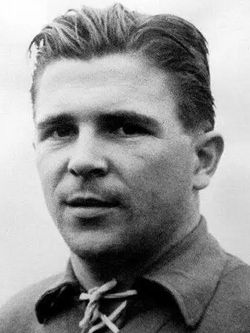
Cause of death: acute pneumonia
172 cm
Ferenc Puskás (Hungarian pronunciation: [ˈfɛrɛnt͡s ˈpuʃkaːʃ], UK: FERR-ents PUUSH-kəsh, PUUSH-kash; né Purczeld; 1 April 1927 – 17 November 2006) was a Hungarian footballer and manager, widely regarded as one of the greatest players of all time and the sport's first international superstar. A forward and an attacking midfielder, he scored 84 goals in 85 international matches for Hungary and later played four international matches for Spain as well. He became an Olympic champion in 1952 and led his nation to the final of the 1954 World Cup. He won three European Cups (1959, 1960, 1966), ten national championships (five Hungarian and five Spanish Primera División) and eight top individual scoring honors. Known as the "Galloping Major", in 1995, he was recognized as the greatest top division scorer of the 20th century by the IFFHS. Scoring 806 goals in 793 official games during his career, he is the seventh top goal scorer of all time by the RSSSF.
He was the son of former footballer Ferenc Puskás Senior. Puskás started his career in Hungary playing for Kispest and Budapest Honvéd. He was the top scorer in the Hungarian League on four occasions and in 1948 he was the top goal scorer in Europe. During the 1950s, he was both a prominent member and captain of the Hungary national team, known as the Mighty Magyars. After the Hungarian Revolution, Puskás served a two year ban from UEFA. Despite failing to sign for Ethnikos Piraeus in 1957 under pressure from rival clubs, in 1958, he emigrated to Spain where he successfully signed for Real Madrid at the age of 31. While playing with the club, Puskás won four Pichichis and scored seven goals in two European Cup finals, winning the competition three times with the club and claiming five consecutive La Liga titles. He scored 619 goals in 618 matches in the Hungarian and Spanish leagues and National Cups.
After retiring as a player, he became a coach. The highlight of his coaching career came in 1971 when he guided Panathinaikos to the European Cup final, where they lost 2–0 to Ajax. He also led the club to the championship in 1972, becoming an icon in the country. Afterward he'd have spells at various countries and clubs, including Spain, Paraguay and the Saudi Arabia national team, with varying success. He returned again to Greece to manage an exceptionally strong AEK team for the 1978–79 season. In 1993, he returned to Hungary and took temporary charge of the Hungary national team. In 1998, he became one of the first ever FIFA/SOS Charity ambassadors. In 2002, the Népstadion in Budapest was renamed the Puskás Ferenc Stadion in his honor. He was also declared the best Hungarian player of the last 50 years by the Hungarian Football Federation in the UEFA Jubilee Awards in November 2003. In October 2009, FIFA announced the introduction of the FIFA Puskás Award, awarded to the player who has scored the "most beautiful goal" over the past year. He was also listed in Pelé's FIFA 100.
Source : Wikipedia